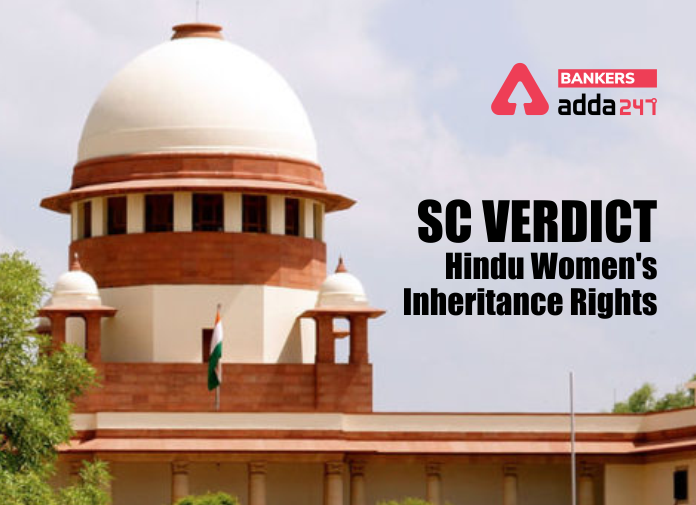Supreme Court of India (SC) has expanded the Hindu women’s right to be the coparcener (joint legal heir) and inherit ancestral property on terms equal to male heirs. The judgment pertains to the Hindu Succession (Amendment) Act, 2005. The court decided that the amended Hindu Succession Act, which gives daughters equal rights to ancestral property, will have a retrospective effect.
What is the ruling?
- It ruled that a Hindu woman’s right to be a joint heir to the ancestral property is by birth and does not depend on whether her father is alive or not.
- Coparcenary (joint-heirship) is by birth, so the father doesn’t need to be living as on 9th September 2005, when the Hindu Succession (Amendment) Act was enacted.
The SC expanded and promoted the amendments done in 2005 which removed the discrimination as contained in Section 6 of the Hindu Succession Act, 1956 by giving equal rights to daughters. - It also directed High Courts to dispose of cases involving this issue within six months since they would have been pending for years.
- The ruling now overrules the verdicts from 2015 and April 2018.
Also Check
- World Elephant Day celebrated on 12th August
- Nation observes 79th Death Anniversary of Rabindranath Tagore
- Nation observes 100th death anniversary of Lokmanya Bal Gangadhar Tilak
- Commonwealth Human Rights Initiative Report on Slavery
About Hindu Succession Act, 1956:
- The Mitakshara school of Hindu law codified as the Hindu Succession Act, 1956 governed succession and inheritance of property but only recognised males as legal heirs.
- It applied to everyone who is not a Muslim, Christian, Parsi or Jew by religion. Buddhists, Sikhs, Jains and followers of Arya Samaj, Brahmo Samaj, are also considered Hindus for this law.
- In a Hindu Undivided Family, several legal heirs through generations can exist jointly. Traditionally, only male descendants of a common ancestor along with their mothers, wives and unmarried daughters are considered a joint Hindu family. The legal heirs hold the family property jointly.
About Hindu Succession (Amendment) Act, 2005:
- The 1956 Act was amended in September 2005 and women were recognised as coparceners for property partitions arising from 2005.
- Section 6 of the Act was amended to make a daughter of a coparcener also a coparcener by birth “in her own right in the same manner as the son”.
- It also gave the daughter the same rights and liabilities “in the coparcenary property as she would have had if she had been a son”.
- The law applies to ancestral property and to intestate succession in personal property, where succession happens as per law and not through a will.
Also Check
- 15th India-EU Virtual Summit 2020
- MOHUA announced results of Star rating of garbage-free cities
- HIV Vaccine Awareness Day
- 45th India Ideas Summit 2020
Background for the Amendment:
- The 174th Law Commission Report had recommended the reform in Hindu succession law.
- Before the 2005 amendment, Andhra Pradesh, Karnataka, Maharashtra and Tamil Nadu had made this change in the law and Kerala had abolished the Hindu Joint Family System in 1975.
Government of India Stand:
- The Solicitor General of India has argued in favour of an expansive reading of the law to allow equal rights for women.
- He criticised the Mitakshara coparcenary 1956 law because it contributed to discrimination on the ground of gender and was also oppressive and negated the fundamental right of equality (Articles 14 to 18) guaranteed by the Constitution of India.
Also Check
Click Here to Register for Bank Exams 2020 Preparation Material
Visit Achieversadda.com and participate in discussions with other aspirants and achievers. Get answers to your queries and connect with others on Achieversadda.com




 Weekly Current Affairs One Liners 23rd t...
Weekly Current Affairs One Liners 23rd t...
 CSIR CRRI Typing Test 2025 Date for JSA ...
CSIR CRRI Typing Test 2025 Date for JSA ...
 Can Final Year Students Apply for SBI PO...
Can Final Year Students Apply for SBI PO...


